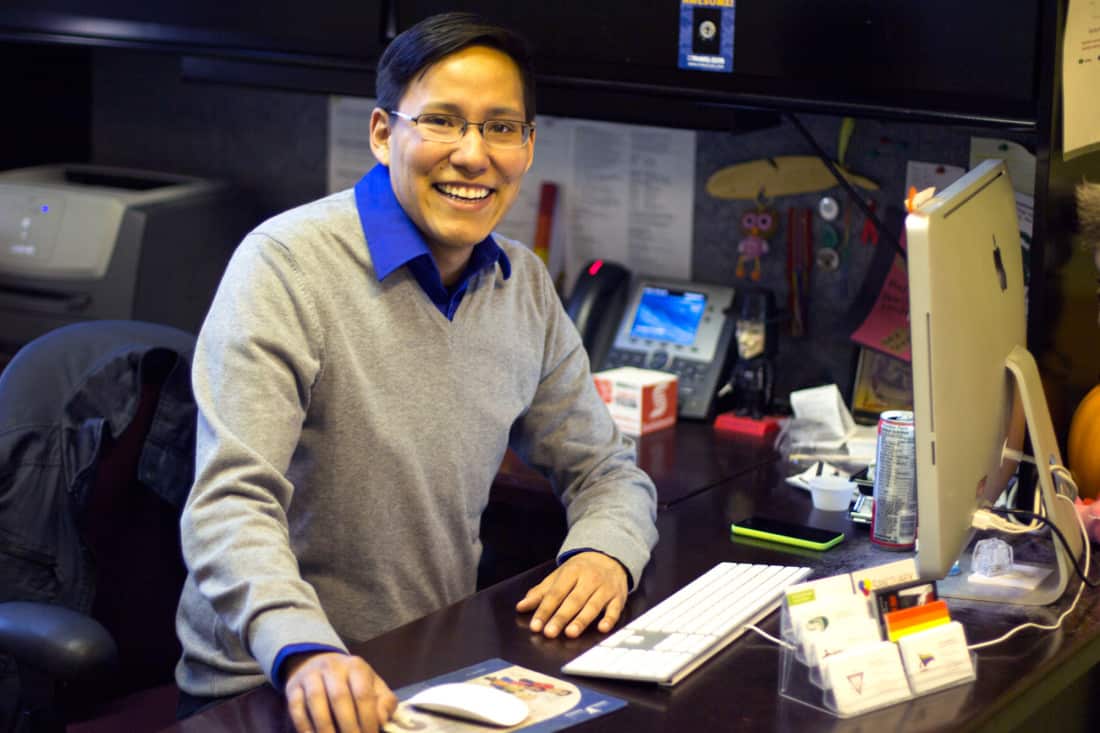
USSU Pride Centre Coordinator Jack Saddleback led the charge to amend the university’s non-discrimination policy to include gender expression, gender identity and two-spirit identities.
The University of Saskatchewan has added gender identity, gender expression and two-spirit identities to its Discrimination and Harassment Prevention Policy.
The amendments to the DHP policy came after a number of students, faculty, staff and community organizations delivered letters of support to the U of S Board of Governors. The board voted in favor of the revisions on March 18.
“This is important because it showcases the fact that the university is understanding that transgender rights are human rights,” said Jack Saddleback, the U of S Students’ Union Pride Centre Coordinator and one of the initiative’s leaders.
Gender identity is a person’s internal perception of their gender. Gender expression, on the other hand, is how a person chooses to express that gender externally in how they act, dress and interact with others.
Two-spirit identity is a term used to describe Aboriginal people who wish to consolidate their First Nations identity with their gender.
“People wanted to take their queer identity and their Aboriginal identity, which are different but together make up one person,” Saddleback said. “Those are intertwined, but also give a historical context into the acceptance of queer Aboriginal people in First Nations tribes before colonization.”
The process of having the university’s DHP policy amended started in summer 2013. Joe Wickenhauser, an elected member of University Senate and Mikayla Schultz, the Executive Director of TransSask Support Services, came to Saddleback with the idea of making the changes. Saddleback said that as the USSU Pride Centre coordinator, a large part of his job is advocacy for gender issues, so he threw his support behind Schultz and Wickenhauser’s initiative.
“When I was elected, a friend of my mine from TransSask Support Services said, ‘Now that you’re part of University Senate, what are you doing to help the trans community at the university?’” Wickenhauser said. “When I looked into [the university’s non-discrimination policy], we found there was no mention of gender expression, gender identity or two-spirit identities.”
Saddleback credited both Wickenhauser and Schultz for their role in the process.
“They’re both amazing people and I’m very humbled to have worked with them,” Saddleback said.
After two months of research on the issues, the group began asking for letters of support from campus and community organizations. About 30 organizations, including the U of S Aboriginal Students’ Centre, the Graduate Students’ Association and the Canadian Research Institute for the Advancement of Women, provided letters of support to the initiative.
The amendments also found support in the university’s administration. Associate Vice-President Human Resources Barb Daigle and Associate Vice-President Student Affairs David Hannah signed the policy revision as sponsors.
“These changes expand our commitment to a discrimination and harassment free environment, and send a clear signal to the university community that faculty, staff and students of various gender identities, gender expressions and two-spirit identities are valued members of our community, and that harassment or discrimination against them will not be tolerated,” Hannah wrote in an email to the Sheaf.
With the policy change, the U of S joins 11 other U15 universities — a group of 15 research-intensive Canadian universities — who have some form of gender expression or identity in their non-discrimination policies. The University of Alberta, the University of Western Ontario, Waterloo University and Dalhousie University are among the schools who have added gender identity or expression to their policies.
However, the U of S is the first university to include two-spirit identities. With over 2,000 self-declared Aboriginal students on campus, Saddleback said the change is especially important to these students.
“I really, really love how we’re the first university to have two-spirit identities in our policy and want to credit the individuals who stepped up to help this decolonization that’s been going on and to foster that learning from one another,” Saddleback said.
Wickenhauser said that although the changes to the DHP policy may seem minor to some students, they mean a lot to others.
“It is important to tackling systemic problems. Just making sure students who identify as trans are able to get their preferred name on their student card,” Wickenhauser said. “It may seem like a small thing, but it can be a really big thing to a trans student.”
Saddleback said he’s happy with how the university’s DHP policy looks right now, but that there is always a possibility something new could be added.
“I think right now, it’s fantastic, but we’ll see. Maybe in 20 years there’ll be something that I didn’t see that needs to be added,” Saddleback said. “This is how this current policy revision came in — fresh eyes looking at it and saying ‘this needs to be added.’”
The third annual Time for Rights Week takes place March 31 to April 5. On April 3 there will be a trans-solidarity rally at 12 p.m. in the Bowl and a letter signing to send to the Saskatchewan Legislature to add these policy amendments to the provincial human rights code. A photo booth will also be in Upper Place Riel 9 a.m. to 2 p.m.
—
Photo: Katherine Fedoroff
Leave a Reply